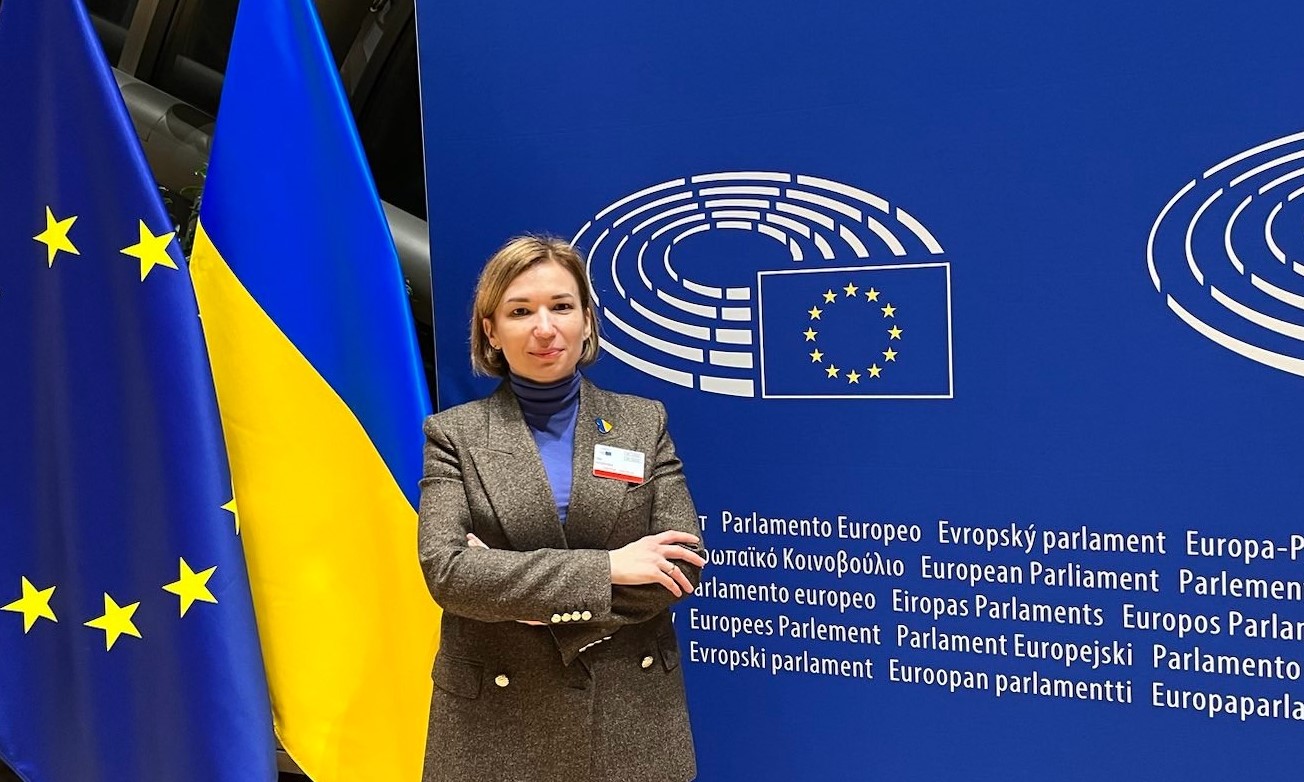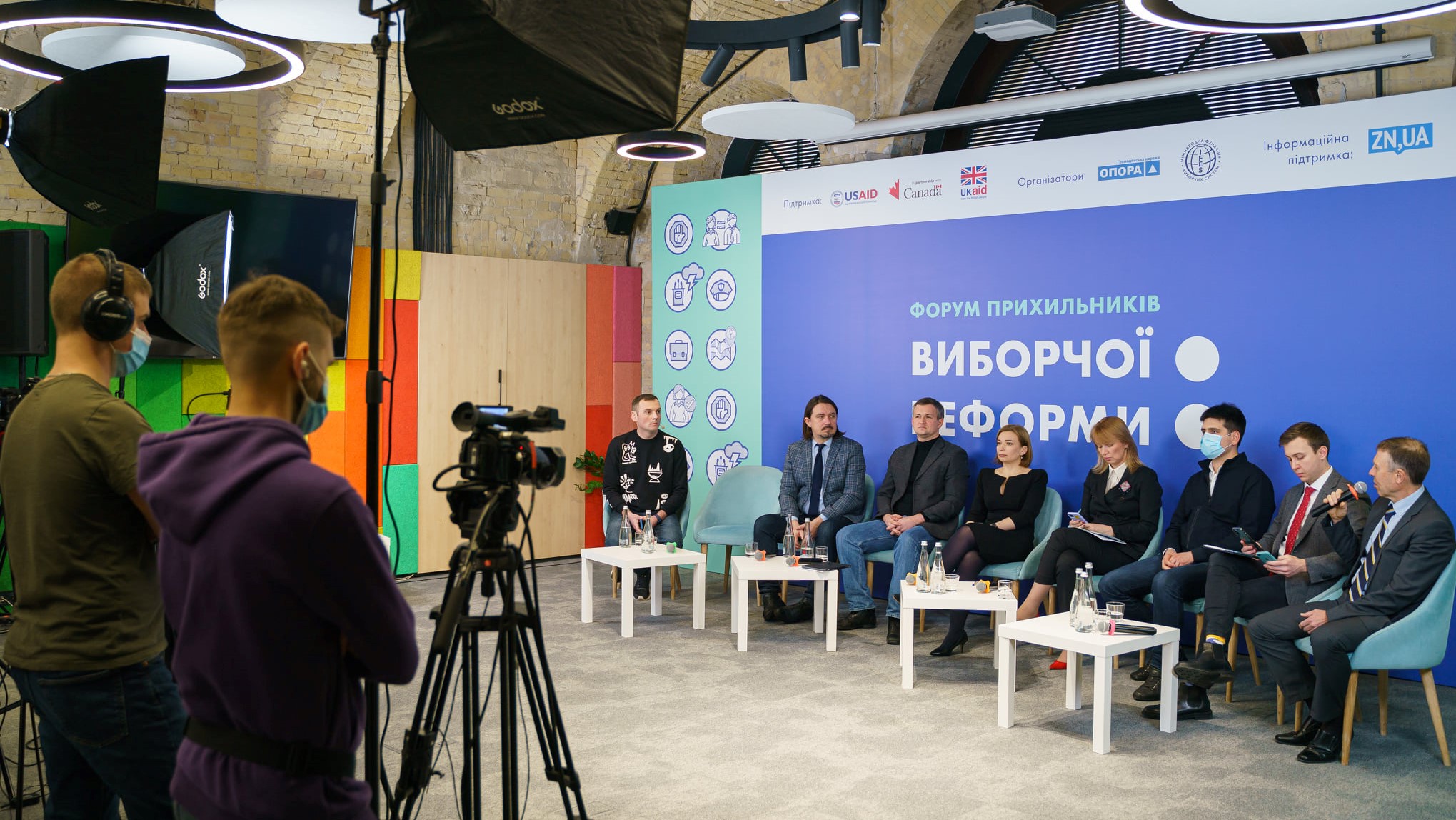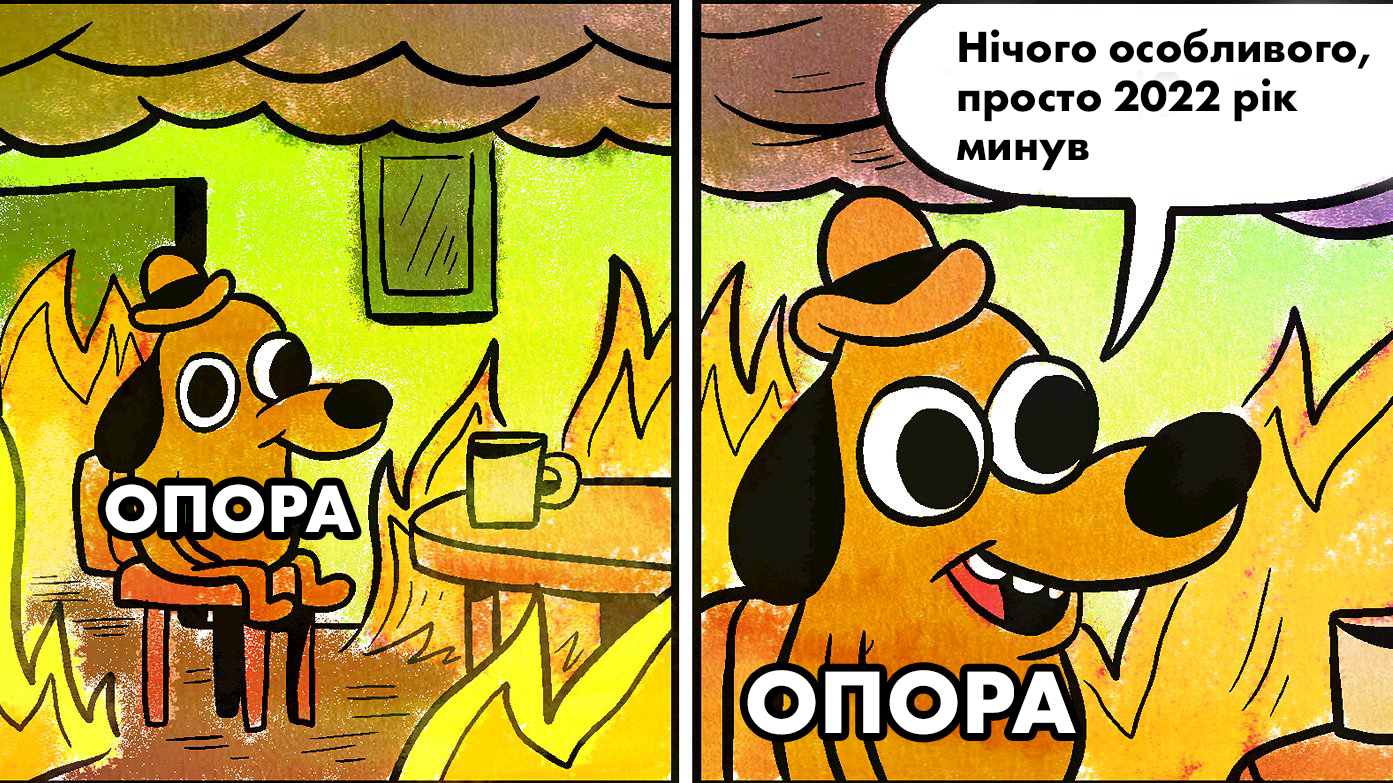What makes us different from the neighbouring terrorist aggressor country? The struggle for the right to self-determination despite external circumstances. This has been a challenging year. Each person took care of their own safety and of their loved ones: some quickly made a decision to relocate the children, some went to defend the country, some were caught in occupation. However, all of us, each in their proper place, are bringing our common victory closer.
After the full-scale invasion of russia, OPORA shifted their focus to address new topics. Why are war crimes and the tribunal in the focus of our attention? Because we have lawyers who are able to understand the intricacies of international law, and a network of monitors who can be useful in documenting testimonies. Why are we tracking the language of war? Because it is necessary to record political statements and processes around the war of russia in Ukraine in order to clearly know who influences them. We need to know it other than intuitively; we rather need to have the evidence-based resources, in order to effectively use the findings to advocate for Ukraine's needs in the world. Why is it important to be mindful of the development of high-quality legislation, including electoral legislation? Because now Ukraine defends democratic principles against the attack of authoritarianism and dictatorship. In addition, after the victory, we must quickly resume peaceful democratic procedures, and this will be much easier to do if we design legal solutions in advance.
Our expertise, acquired both in the previous 17 years and during the full-scale invasion, was in demand during international testimonies, for example, in the US Congress, the Senate of Canada, and the European Parliament. In total, OPORA managed to do a lot in 2022. It was all possible only due to the success of the Defense Forces, and also because all Ukrainian people zealously continue to work for victory.
Documentation of War Crimes
Since the beginning of the full-scale invasion, OPORA has started collecting testimonies about the war crimes committed by russians. We were among the first organizations to collect, verify, file, and send to the OSCE a report recording 57 facts of war crimes under the "Moscow mechanism" (named after its approval in 1991 at the OSCE Human Dimension Conference in Moscow). In March, 45 OSCE participating states, including Ukraine, activated this procedure for a full-scale Russian invasion to deploy an independent international mission. The work resulted in a report that is of legal significance for bringing perpetrators to justice in national and international courts and tribunals, in particular in the International Criminal Court and the International Court of Justice.
Besides that, OPORA experts joined the International Council of Experts on Crimes Committed in the Context of Armed Conflict under the Office of the Prosecutor General and established a systemic interaction with the Prosecutor's Office of the Republic of Poland. The Council coordinates cooperation between official state bodies and non-governmental organizations helping the state of Ukraine to achieve fair punishment for the war crimes of Russians at the international level.
Since August, the Center for Assistance in War Crimes Documentation in Warsaw has become operational. Lawyers and psychologists of the Center visit the places where Ukrainian war refugees live, and collect data about them as witnesses of war crimes. During the four active months of the Center's activities, they collected 519 preliminary interviews with victims. The most terrible of the recorded crimes include the following murder, shooting and wounding — 141 testimonies, illegal detention and arbitrary conviction — 129 testimonies, torture — 105 testimonies. All collected information is digitized, translated, and transferred for further work to the Polish Prosecutor's Office, the body authorized to conduct an official investigation. This type of appropriate documentation of testimonies through law enforcement agencies ensures that this data can become the evidence base in international courts and tribunals for bringing Russians to justice.
Founding of the Special Tribunal and the International Center for Ukrainian Victory
An important component of OPORA's activity was the international advocacy for the establishment of the Special Tribunal on the Crime of Aggression for Putin and other Russian high-ranking officials. Available international legal mechanisms, such as the ones employed within the UN Security Council, may not work. To prevent new invading wars in the world, Russia must be punished for its act of aggression against Ukraine. This can be achieved, among other methods, through a bilateral treaty between Ukraine and the European Union on the establishment of the Special Tribunal, which other partner countries can join on the same bilateral basis.
To ensure efficient international work, head of the Board of OPORA, Olha Aivazovska, has become a co-founder of the International Center for Ukrainian Victory, on behalf of OPORA. Its purpose is to provide synergy of efforts of Ukrainian civil society leaders abroad in their advocacy for assistance to Ukraine: from the provision of weapons to energy support, from the development of a recovery plan to the promotion of EU accession, from the establishment of the Special Putin Tribunal to the strengthening of international sanctions against Russia.

Monitoring of the Occupied Territories and Public Positions of the Belligerent Parties
In the summer, online discussions "Occupied" and "War Speeches" were launched on the YouTube channel "OPORA Speaks". During the broadcasts, OPORA experts discuss problems in russia-occupied the territories of Ukraine, and also examine public positions and narratives in official statements of Russian high-ranking officials. In total, these discussions received almost 235,000 views. Analytical materials created on the basis of these discussions are published on the websites of our media partners: "Mirror of the Week" and "Ukrainska Pravda".
Furthermore, before the Russian rigged referenda in the occupied Ukrainian territories, OPORA experts produced an overview of the situation, of legal provisions, and possible solutions on an international level. Additionally, our analysts continued the usual monitoring of Ukrainian Parliament performance. For example, they analyzed the NSDC decision to suspend the activities of some political parties.
Three Sociological Surveys and Monitoring of Social Networks
After the full-scale invasion, OPORA experts designed three sociological surveys of different formats: from a telephone survey under a representative sample to diary studies. Two of them concerned media consumption and attitudes: about where Ukrainian people receive information from, who they trust, what attitudes they have. Thus, the most popular source of information turned out to be social networks — 76.6% of Ukrainians use them for news updates. Also, more respondents prefer the idea of a strongman during a war rather than democracy in the country. Our latest study will tell about the life of Ukrainian war refugees in Poland and their media consumption patterns, trust for the media, whether they plan to return to Ukraine, and whether they will participate in the first post-war elections. The results of the survey will be officially presented on January, 12, next year.
Moreover, OPORA experts have prepared more than 20 studies on transparency of political advertising and dissemination of Russian propaganda in Ukrainian and international segments of social networks.
OPORA also held an Open Election Data and Disinformation Academy in Warsaw, which was attended by representatives of the public sector from 11 countries. Our experts taught foreign colleagues how to find, retrieve, receive and analyze open election data, identify disinformation and advocate for change at the state and regional levels. And also shared with them their tools for collecting data, tracking, and analyzing informational manipulation online.
Five Working Groups to Develop Legislation
A good legislative framework is one of the pillars of efficient democracy. Ukraine is now defending its right to self-determination in order to return to the practices of good governance, post-war reconstruction and further European integration after the victory. That is why it is important to prepare the legal framework in advance, so that the legislation contributes to the recovery processes, and the outdated provisions do not hinder. Throughout the year, OPORA's lawyers have traditionally participated in law-making activities. They attended meetings of five official working groups established in the Parliament to draft laws.
Thus, this year, the work on draft laws on political parties and the opposition has been undereway. The participants of the working group have also finalized the concept of a Code of Ethics for MPs, which will probably be drawn up as a draft law in the middle of next January.
In addition, after the full-scale invasion, a draft law on the prohibition of the so-called "Ruscist ideology" was initiated. However, in the process of work, the experts concluded that it was useless to talk about ideology in the context of Russia. That is why they did not finalize the developments. However, the draft law on media containing the amendments to electoral legislation regulating campaigning managed to be submitted for consideration in the Parliament. However, all the amendments on election campaigning were excluded during the voting, and the corresponding developments had to be registered as a separate draft law.
Two Online Marathons
Although Ukraine did not plan any large election processes this year, since January, there have been many conversations about the change of electoral legislation and some reversal of previous achievements of electoral reform. Thus, OPORA started the calendar year before the full-scale invasion by two online marathons with supporters of open lists in the proportional electoral system and transparent financing of political parties. The discussion was joined by MPs, members of the Central Election Commission, representatives of the National Police, political parties, and experts of Ukrainian and international organizations. Broadcasts of both events were viewed by about 5,000 people in total. Besides that, we shot a mini-film entitled "History of Electoral Reform," as a preparation for these events.
OPORA also presented the findings of in-depth interviews on electoral funds and financing of political parties. In addition, we have published the results of focus group studies on the attitude to different electoral systems, where the relative majority of respondents — 42% — supported for parliamentary elections a proportional electoral system with open lists.

Election Observation in Chernihiv Oblast
On March, 27, by-election of an MP in district #206 in Chernihiv oblast was scheduled to take place. Thus, the election process started on January, 26, and OPORA launched a comprehensive independent observation effort. In particular, we organized the trainings for 350 selected observers. Observers managed to monitor all events at the beginning of the election process, analyzed campaigning and election administration, and assessed violations of electoral legislation and democratic standards.
However, on February, 23, a state of emergency was introduced throughout Ukraine, which prohibits the holding of elections to the Verkhovna Rada. On February, 24, when the full-scale invasion began, Ukraine introduced a martial law, and the election procedures were completed by the appropriate decision of the CEC. After the termination or cancellation of martial law or state of emergency, the suspended election process will start anew, and the CEC should reconsider the appointment of elections.
These events have taught us an important lesson: we need to anticipate possible security risks and be prepared for anything, even a great war. When Russia launched a full-scale offensive, OPORA's long-term observers in Chernihiv oblast were caught in the siege and could not leave for a long time. We are deeply grateful to those brave men and women, and show high respect before their resilience and courage.
Post-War Election Scenarios
In January, OPORA analysts published the final report of the previous year's research on 18 communities in Donetsk and Luhansk oblasts in the territory controlled by Ukraine, where local elections were not held in 2020. However, within a month, the criteria developed by experts for the safe assessment of communities to make decisions on the appointment or non-appointment of elections have become relevant for the entire country. Obviously, after the Ukrainian victory on the battlefield, we will all have to restore democratic processes and develop new procedures for participation in the elections in view of mass migration processes.
OPORA experts have drafted potential scenarios for the first post-war elections on the basis of previous developments. We also started to explore community life to capture successful practices of how people on the ground overcome challenges to return to a safe life. These developments and experiences can be transferred to other communities for post-war reconstruction, the establishment of security conditions for the appointment of the first elections, and the return to classical democratic practices of self-government.
***
On February, 28, Ukraine officially applied for membership in the European Union, under an ad hoc simplified procedure. After that, the country completed a multi-volume questionnaire. On the basis of the questionnaire, on June, 23, EU member states passed a decision to grant Ukraine the candidate status. OPORA experts participated in filling in Section 1 "Democracy and the Rule of Law" of this questionnaire. We answered 8 questions about the state of electoral legislation, activities of the Parliament, and functioning of political parties, because OPORA has been defending democracy in Ukraine for 17 years.
Beyond any doubts, the defense of our country and democracy now depends primarily on the Defense Forces. That is why some of OPORA members are defending our freedom and principles with the weapon in their hands. However, each of our studies, each of our analytical materials, each of our videos is a small part contributing to a common future outcome preserving democratic practices and the reconstruction of the country. Elections are only one democratic tool, among others. Furthermore, systemic participation, security, and justice are the pillars of democracy that distinguish us from our neighboring aggressor country.
